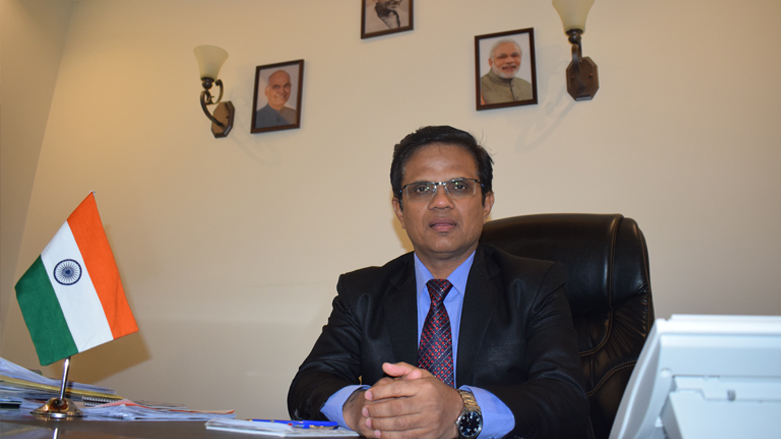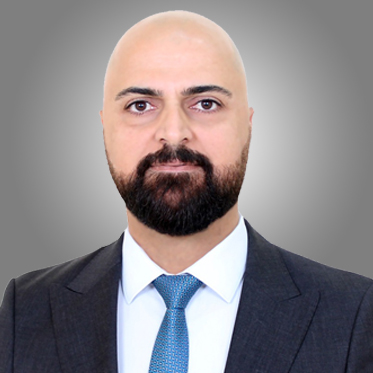‘Kurdistan Region was one of mild astonishment and major surprise’: India's envoy to Erbil

ERBIL (Kurdistan Region) – India’s Consul General in Erbil told Kurdistan 24 on Saturday that his diplomatic mission in the Kurdistan Region is looking to boost India’s trade in the autonomous region of Iraq.
“With the pandemic abating, we’re looking to ramp up our engagements in the commercial sphere,” Kain told Kurdistan 24. “We are working hard on educating Indian investors in India about the vast potential available in various sectors in Kurdistan Region, especially in the fields of pharmaceuticals, steel, cement, agriculture, and animal husbandry.”
Kain revealed that India has emerged as a much-favored medical tourism destination for those from the Kurdistan Region and that his mission is always looking to expand that sector.
“Construction materials, steel, and pharmaceuticals are also some areas in which we’re looking to expand trade,” he said, describing commerce between India and the Kurdistan Region as significant, but pointing out that there is still much room for enhancement.
“I believe there’s enormous potential and we have not been able to exploit much of that, owing to various factors,” Kain said. “The possibilities of the Kurdistan Region as an investment avenue need to be further explored by Indian business community.”
Kain mentioned that, every year, a delegation of Kurdish businessmen and entrepreneurs travels to India to participate in the annual IndusFood Festival. Indusfood is the most comprehensive food and beverage marketplace in the South Asian region, showcasing related products, processing, and packaging technology.
“The Kurdistan Region and India share widespread cultural ties and, therefore, we’re looking to expand and accelerate activities in the cultural sphere and thereby expand our cultural relations with Kurdistan Region,” the diplomat continued. “We’re in the process of inviting an Indian cultural troupe at a suitable time to Erbil for an exposition in Indian classical folk dance.”

Kain revealed that there are multiple additional activities in the pipeline aimed at increasing trade between the two governments, saying, “We’re also in the process of instituting Chairs of Indian Studies in some universities in the Kurdistan Region of Iraq.”
Regarding the upcoming events of the Indian Consulate in Erbil, Kain said that his consulate is scheduling major events for the rest of the year.
“We plan to celebrate Indian festivals like Holi and Diwali here in Kurdistan Region, with members of Indian community and our Kurdish friends,” he said, adding, “November 26 is our Constitution Day and we’ll be inviting Indian professors in the Kurdistan Region for seminars about the Indian Constitution.”
Kain confirmed that the Indian Consulate in Erbil provides visas to significant numbers of Kurdistan Region residents to travel to India for medical treatment, education, and business.
“However, due to corona pandemic, we have temporarily suspended the issuance of tourist visas and we hope to resume issuance of tourist visas once the COVID situation improves worldwide,” Kain added.
Kain expressed delight to host young students from across the world to continue higher education in India, pointing out that they have two flagship programs for foreign students to study there; (ICCR) scholarship and (Study in India) scholarship catering to different types of students.
“ICCR is an autonomous body under the Government of India, mandated to foster and strengthen cultural relations with different countries across the globe; it also administers full scholarship programs, offering studying courses for undergraduate, post-graduate, and PhD levels in various disciplines (http://a2ascholarships.iccr.gov.in),” he explained.
Study in India, he said, “serves as an intermediary for students to explore, connect, and apply to various top-ranked institutions in India, but it caters to only a few regions of the globe, and I’m happy to inform that the Middle-East is one such region,” he continued, specifying that “the program is currently offering approximately 55,000 seats with more than 35,500 fee waivers and 2,000 scholarships, with each scholarship valued at INR 250,000 ($ 3327 approximately) across a diverse range of courses, with Institutes under the initiative offer 25% to 100% tuition fee waivers.” (https://www.studyinindia.gov.in)
Kain estimated that around 8,000 Indians reside in the Kurdistan Region, and expressed enthusiasm at the fact that Kurdish employers are keen to engage Indian employees.
“While we are confident that the Kurdish people and government will continue to take care of their Indian brethren living in Kurdistan, we appeal to all Indians in Kurdistan to uphold the image of their country and cherish the great bondage shared between the two regions,” he stated, adding, “We are also confident that the people and the Government of Kurdistan Region will continue to protect the Indians in Kurdistan as they have been doing all these years.”
Regarding his experiences in Erbil so far, Kain revealed that it took him very little time to understand how his initial fear of travelling to the Kurdistan Region was unfounded and is now convinced it needs an image makeover in India.
“I was very pleasantly surprised by Erbil at first sight- the airport could’ve been European if not for the signs in Arabic and Kurdish, and my first impression of the Kurdistan Region was one of mild astonishment and major surprise,” Kain said. “I think people need to travel to Erbil, once travel restrictions are eased, and to find out for themselves how safe and secure the region is”.
Regarding the cultural similarities between the two cultures, Kain pointed out that both nations observe strong family bonds, and respect elders. “Hospitality towards the guests is a virtue, followed by both people’s cultures,” Kain said. “Both love music, dance, happy occasions, and, like Indians, Kurdish women also love to wear colorful dresses, and that is the reason Indian cinema and Indian family drama serials are a hit in Kurdistan.”
Kain also said that he loves Kurdish food, especially Dolma. “I feel that Dolma deserves a special mention for the sheer innovation that goes into making it,” Kain said. “I frequently meet with Kurdish people in the course of my diplomatic duties, and I am always being treated to new Kurdish dishes. Some of the smells and textures are same as Indian cuisine, but the way they blend to create new tastes never fails to surprise me.”
He also remarked that Kurds love Basmati rice from India, with around 2,000 - 3,000 containers of rice being exported from India to Kurdistan Region every year. “Kebabs, biryani, rotis, and rice are common between the two,” Kain said. “Both enjoy tasty food, but Kurds prefer less spicy food than Indians.”
“The most common factor between the two regions is the pluralism,” the diplomat concluded, “People of all religions and ethnicities live harmoniously in India and the Kurdistan Region, and both regions believe in the concept of Unity in Diversity.”
Kain arrived in Erbil on Sept. 30, 2020. Before being assigned to Erbil, he served in Kazakhstan, the Philippines, Cambodia, and South Korea; as well as assignments at the headquarters of the Indian Ministry of External Affairs.
